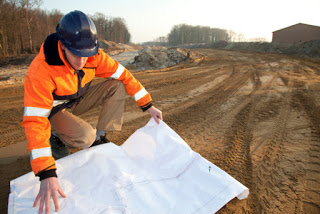 |
| What is Right of Way? |
What is Right of Way?
Here’s an example of what Right of Way (ROW) is. A city owns a public street that goes through a residential neighborhood. They also own a few feet past the pavement on both sides of the street. If a residential street is 30-36 feet wide the city may own a total of 46-50+ feet wide area. So, yes they own part of your front yard. Virtually all public streets are like this, from local residential streets on up to interstate highways which may have ROWs that are hundreds of feet wide.
Why Right of Way
The government holds a right of way wider than the actual street for several reasons. They use the extra land for things like public sidewalks, utilities, or to widen the road in the future. Also, street lights, traffic signals and street parking are all in the ROW.
Right of Way is something that we have to know where is, but civil engineers don’t typically worry about why it’s where it is or how to get more. That sort of thing is typically handled by the government agency itself. Or was figured out when the property was first developed. Civil engineers don’t generally get more once an area is already developed.
However, I’ve had the privilege recently to work on a ROW acquisition project recently. That’s a service that our company offers, and my background in roadway design helped get me involved in a roadway ROW project.
The project
Here are the basics of the project. A two lane county road needed to be widened because of all of the development nearby. Plans were drawn up and the road was designed, but the county didn’t actually own enough land to make the road wider. That’s where we came in on the project. The county hired us to acquire the land for them.
What you have to do
There are several steps involved in ROW acquisition. I’m going to go over the broad steps. Perhaps at a later date I’ll write a more detailed article, or ask our resident expert to put one together for me.
Survey
It seems that everything in civil engineering begins with a survey. The same applies here. With the survey and the plans we can see exactly how much land is needed from each land owner. The surveyor provides documents showing exactly how much land is needed. They generally will also mark the area with flags or other markers.
Initial Letter
An initial letter is sent to the current land owner to let them know about the surveyors and appraisers coming onto their property. The letter also lets the owner know what’s going on with the project; the whys, the whos, etc.
Like Us on Facebook!
Appraisals
Next the appraisers go to work. They appraise each plot of land that the government needs to buy. The appraisers generally will take into account mailboxes, fences, trees and anything else that may be in the proposed right of way area that current land owner would have to move or lose value if it’s removed.
Subscribe Us on YouTube!
Title Search
Just like when you buy any piece of property, you do a title search to find out who actually owns the land. This will also tell you about any liens on the property such as a mortgage, tax lien or unpaid debt. Any lien will affect the sale.
Offer Letters
Send the initial offer letter. Basically the offer is for what the appraiser valued the land at.
Negotiation
This can be real long or real short depending on what the land owner wants. I’ve seen some just sign the paperwork and send it back. Some think their land is worth more, some will want fences or custom mailboxes replaced, trees paid for, or many other things. Some just flat out refuse to sell. In most cases something can be worked out to the benefit of both the land owner and the municipality.
Partial Release of Lien
We do have to deal with any liens that are on the property. If there is a mortgage, for example, we have to get a partial release of lien. Basically the bank has to give up that part of the land on their deed. Lien holders may have the right to the money first. That varies some by location. Banks sometimes require a percentage of the money based on a percentage of the property sold.
Acceptance or Condemnation
Eventually, after the negotiations, the land owner accepts or they don’t. If they accept, then the paperwork is signed, they get their money and the government gets the land. If they are unwilling to sign, then it goes to condemnation. That means that it goes before a third party to decide the case. Generally when this happens the government gets the land and the land owner gets fair market value for their property. Because of the expense it really doesn’t do anybody any good to go to condemnation. As long as we follow the laws and our engineering ethics guidelines we are fine.
There is a lot more to it, but that covers the basic process. It is certainly a good thing to know, even if you never do ROW acquisition yourself. Having the knowledge gives you a better understanding of the process and what the municipality has to do on some projects. However, having the expertise can give your company another product to offer municipal clients.


















